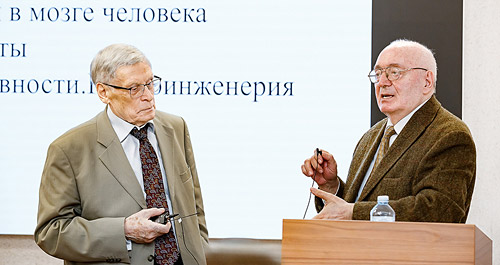
Electronic english version since 2022 |
The newspaper was founded in November 1957
| |
Seminars
Consciousness is the whole Universe
On 3 April, Corresponding Member of the Russian Academy of Sciences, Doctor of Chemical Sciences, Professor Sergey VARFOLOMEEV delivered a report on "Molecular foundations of intelligence. Kinetics of chemical reactions in the human brain. Neuroengineering" at the Laboratory of Radiation Biology of JINR.
 |
| E.A.Krasavin and S.D.Varfolomeev |
Opening the seminar, its leader, Corresponding Member of the Russian Academy of Sciences, Chairman of the Scientific Council of the Russian Academy of Sciences for Radiobiology E.A.Krasavin noted that this activity is resumed after a break due to the pandemic. The title has changed from biophysical to radiobiological and the subject matter covers a wide range of fundamental issues in radiobiology. "The topic of today's report: consciousness is the whole Universe," Evgeny Aleksandrovich noted. "I have always emphasized that the physicists of our Institute, in one way or another, deal with issues of the universe and space. There is a physical Universe and there is a Universe of the mind."
"I have said and I am saying that Dubna, JINR is a pearl of Soviet and Russian science. The audience and the air here are phenomenal and it is a great pleasure and a great privilege to make a speech here," Sergey Dmitrievich prefaced his report. "I represent here the Faculty of Chemistry of Moscow State University where I have worked since 1963 and the Institute of Biochemical Physics that is part of the Institute established by my teacher N.N.Semenov. Several years ago, Rector of Moscow State University V.A.Sadovnichy suggested me to establish the Institute of Physical and Chemical Fundamentals of the Functioning of Neuronal Networks and Artificial Intelligence at the faculty to study fundamental issues: the mechanisms of registering, reading information and regulating these processes; molecular polymorphism of brain proteins; control of neurons using external physical fields; intercourse between the brain and computer. What ensures the decoding of the molecular mechanisms of intelligence? Elucidation of the structure of most proteins of the neurosystem with atomic resolution; computer revolution - supercomputers that allow meeting systems of differential equations; NMR spectroscopy and functional magnetic resonance imaging; neurochemistry - basic chemical reactions. The main thing for us is the development of chemical kinetics as a methodology for studying the mechanisms of bioprocesses (biokinetics)".
In his report, Sergey Dmitrievich remembered his teacher Academician Nikolay Semenov, thanks to whom we are currently leaders in chemical kinetics research. Increase in computer productivity and the capabilities of supercomputers, namely the Lomonosov SC that is widely used to meet specific issues play a great role in it. It is impossible to address issues of this kind without a supercomputer: the human brain consists of 80 billion cells, each of which interacts with thousands of neighboring ones.
S.D.Varfolomeev dedicated a significant part of his report to memory issues. What brain structures are responsible for memory? What substances can suppress or stimulate cognitive abilities - remembering and storing information? The functioning of memory is inextricably linked with the mechanism of acetylcholine and glutamate synapses. Based on this, "chemical" techniques of memory control are currently developed using drugs - blockers and stimulants.
The speaker focused on the issue of enzyme kinetics. There has been a revolution in this area, with technologies that allow to study every stage of the enzyme kinetics cycle. Understanding the mechanism of enzymes will help in the investigation of neurodegenerative diseases, such as Canavan disease. A hypothesis arose that the data transmission mechanism is blocked by the action of an enzyme that affects the conductivity of synapses.
Regarding the physical characteristics of memory, the speaker noted that the brain, as it happened historically, was created in order to remember movements and not the multiplication table. Any recognition system results in the formation of a "neural image" and a "conductivity track" in memory.
Employees of the Institute of Physical and Chemical Foundations of the Functioning of Neuronal Networks and Artificial Intelligence carried out a biochemical analysis of the pharmacological effect on brain function of six thousand drugs registered in the United States. It turned out that 20 of them - drugs for parasites, analgesics, sedatives and others are also inhibitors of carboxylesterase, an enzyme that stimulates brain function. "We know for sure that the characteristics of the chemical structure of a protein determine its functional activity. And all neuropathologies, schizophrenia, Canavan disease, Alzheimer's disease and others are of a nature caused by disruption of neurosynaptic contacts," the speaker noted.
Regarding neuroengineering, Sergey Dmitrievich recalled I.Musk's idea: by implanting a chip in a person's brain, try to control his behavior and noted that this idea is not new. At the same time, over time, implanted electrodes lose functionality due to corrosion, overgrowth with proteins and other reasons. "We decided we need to introduce ferromagnetic and magnetic nanoparticles," he noted. Animals with such nanoparticles introduced into the blood in an external magnetic field change their behavior.
* * *
Answers to numerous questions turned into a separate mini-lecture. In addition to specific questions from biologists and physicists (the seminar brought together representatives of all laboratories of the Institute) general human questions were also asked.
Is it possible to recognize in advance whether a person is a physicist or a lyricist?
Such investigations have been carried out, all predispositions are determined genetically and underlie the structure of synapses.
Is human origins an accident or a pattern?
The nervous system and multicellular creatures are natural processes; the brain is necessary to regulate metabolism.
What exactly is intelligence?
A certain set of abilities to store and operate information, concentrate attention and more.
Olga TARANTINA,
photo by Elena PUZYNINA